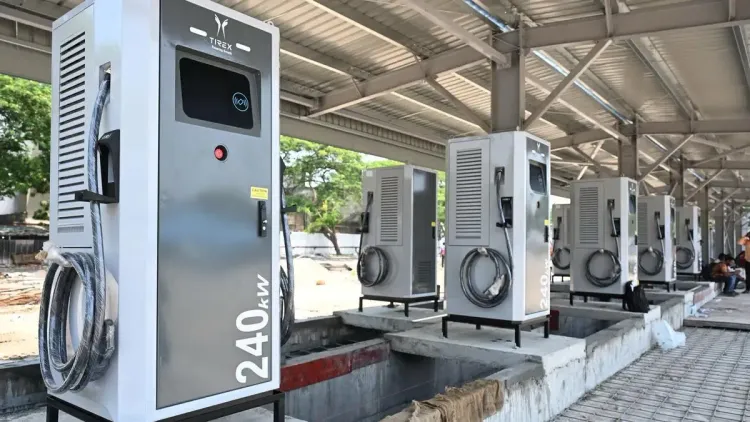Is Tamil Nadu Making EV Charging Infrastructure Mandatory in New Buildings?

Synopsis
Key Takeaways
- New buildings must include EV charging points.
- Regulations apply to residential, commercial, and large structures.
- Exemptions exist for smaller buildings.
- 10% of parking spaces must be designated for EVs in larger projects.
- Initiative aligns with Tamil Nadu's green transport goals.
Chennai, Nov 8 (NationPress) In a significant initiative to foster electric mobility, the Tamil Nadu Housing and Urban Development Department has mandated that all new residential, commercial, and large buildings must incorporate electric vehicle (EV) charging points. The department has officially revised the Tamil Nadu Combined Development and Building Rules, 2019, to integrate EV charging infrastructure as a fundamental aspect of future constructions statewide.
According to the updated regulations, all new residential buildings are required to provide charging points for electric vehicles corresponding to each designated car and two-wheeler parking space. This stipulation ensures that every parking slot, whether intended for a car or a two-wheeler, is equipped with its own EV charging point.
For larger residential complexes with over 50 dwelling units, the revision also requires the installation of fast-charging points for visitor parking areas. These enhancements aim to make charging facilities more accessible for both residents and visitors in multi-unit developments.
However, smaller residential structures are exempt from these regulations. The rule does not apply to buildings under 14 metres in height, those with eight or fewer dwelling units, or those with a total built-up area of less than 750 square metres.
The new regulations extend to commercial, industrial, and institutional buildings as well.
Projects with a Floor Space Index (FSI) area exceeding 300 square metres must now allocate a minimum of 10 percent of their parking spaces for EVs. These designated spaces must include fast-charging points, ensuring that workplaces, shopping centres, and other commercial facilities contribute to expanding the EV charging network.
Officials have stated that this amendment aligns with the Tamil Nadu Electric Vehicle Policy, 2023, which recommended revising building codes to facilitate the shift towards green transport.
The policy underscores that charging infrastructure should be integrated during the design phase of all new constructions rather than being an afterthought.
Moreover, the policy encourages existing residential townships and apartment associations to voluntarily adopt EV charging infrastructure.
Apartment complexes housing more than 50 families and residential townships with over 500 families are urged to install charging points, while commercial entities such as hotels, malls, and cinema halls are also encouraged to comply.
Officials conclude that this reform is a pivotal step in Tamil Nadu's broader vision to position itself as India's leader in electric mobility, ensuring a clean, sustainable, and convenient transportation system for the future.










